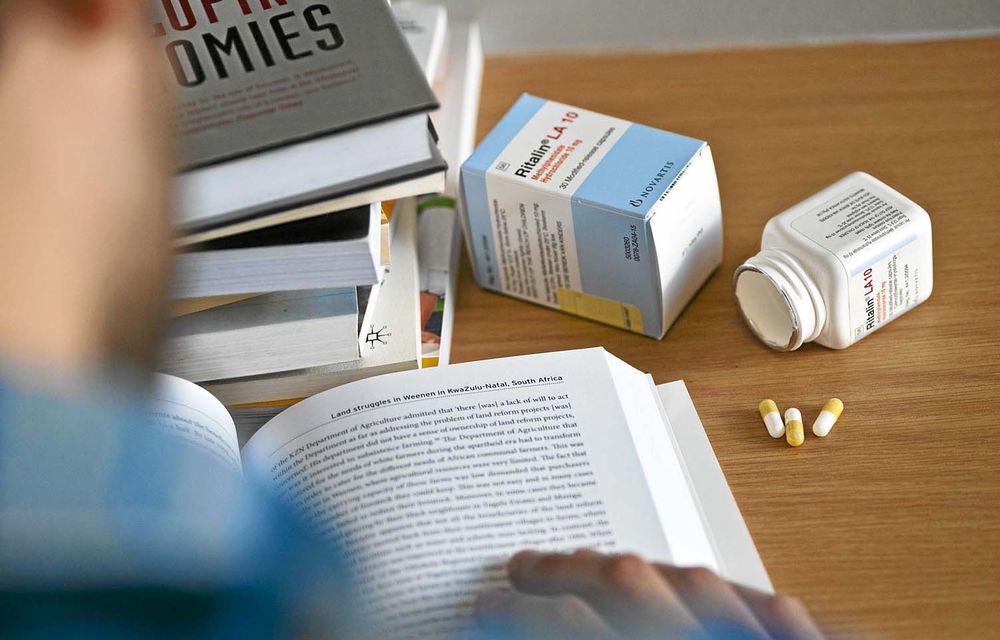Students are abusing schedule six pills ahead of exams — with the help of their doctors.
‘My brother’s mates at varsity used to ask me for pills, and whenever I would say no [he] would steal a few tablets anyway,” Melissa* says. “One of his mates then got a prescription and started selling them at Wits,” she adds. “I think few people realise how common it is.”
Melissa used Concerta, a drug very similar to the attention deficit disorder pill Ritalin, for two years at university. “I have severe attention deficit and hyperactivity disorder [ADHD] and it helped me immensely while studying,” she says.
These drugs have been a godsend to those with ADHD, often completely changing their lives. But the pills have attributes that also make them attractive to those without the disorder. They increase wakefulness and concentration – and have consequently become popular on university campuses all over the world, creating a black market for the drug.
For instance, Druvi Patrick Rodrigo (23) was charged last year for selling Ritalin to fellow students in New Zealand. Late last month he pleaded guilty in court, was convicted and is awaiting his sentence, which is likely to be extensive community service.
However, as Melissa’s case shows, so-called “dealers” aren’t always involved and legitimate users of the drug are frequently harassed by others for their pills.
“Mates of mine used to see me take them and see the effect they could have on me and would constantly ask me for a few – to the extent where two actually went to a psychiatrist to get it prescribed,” says Melissa. “It’s insanely easy.”
Schedule-six drugs
Ritalin and Concerta are schedule-six medications — the highest legally scheduled drugs available in South Africa. Such medicines’ distribution is rigorously controlled because they are extremely effective, and, as a result, can easily be abused.
“All movement from one level of the distribution system to another is on the basis of written orders, signed by a person authorised to procure such substances, and with records of all receipts and issues at each point,” says Andy Gray, a senior lecturer at the University of KwaZulu-Natal’s pharmacy department. “[These registers are] balanced every three months, with records retained for five years at the place where the transaction took place.”
According to Gray it is unlikely that these drugs would become unaccounted for at any point in this stringently managed distribution chain. The most possible point at which Ritalin or Concerta enters the black market is therefore through valid and legal prescriptions from health professionals, ending up in the hands of people who don’t need them.
The problem is twofold.
First, ADHD is not being diagnosed with the caution and rigour with which official guidelines say it should be: it is regularly identified by a general practitioner, whereas it should require a diagnostic expert panel.
“Making the diagnosis needs a specialist team, on the one hand, and it needs comprehensive assessment, on the other,” explains general and forensic psychiatrist Dr Mo Nagdee from one of South Africa’s largest mental health facilities, Fort England Hospital in Grahamstown. “[On the specialist teams], ideally you would have a child and adolescent psychiatrist, other mental health professionals – social workers and occupational therapists – [as well as] family members and teachers,” he adds.
But this rarely happens, resulting in patients who were never formally assessed for the condition and do not need the medication receiving ADHD drug prescriptions.
Proper diagnosing “unrealistic” for SA
“In an ideal world that’s the way it should be done,” agrees Grahamstown general practitioner Dr Dario Berenisco. “But it’s unrealistic for South Africa.”
Berenisco says it is simply too “resource intensive” to see so many specialists. “There is just no access – even for private patients.”
GPs such as Berenisco sometimes verify an ADHD diagnosis by putting someone with possible symptoms on medication and monitoring the patient to see whether the pills work. “If there is any doubt in terms of the efficacy of the drug then it’s not ADHD, but if there is a dramatic difference then we can assume it is,” he says.
However, Durban-based educational psychologist David Weeks disagrees. “I don’t think that prescribing the medicine and seeing what happens is an appropriate approach,” he says.
“My old professor would ask: If you suspect someone of having cancer, would you give them chemotherapy?”
The head of the child psychiatry unit at Chris Hani Baragwanath Hospital in Soweto, Dr Helen Clark, warns: “It may look like the drug doesn’t work, yet it is a problem with the dosage, or it may look like it is working but there are actually other reasons for that.”
She says the “diagnosis and treatment of ADHD is an art”. “In every person it looks a bit different [not all ADHD is the same] – you need to get the dosing and timing right to suit the needs of the individual.”
Clark believes that GPs’ “strict time restraints” may prevent them from diagnosing accurately. “We need to develop an effective way of evaluating the patient for ADHD that is less time-consuming,” she says.
The second side of the problem is that health professionals often prescribe Ritalin for its express use as a study aid, without even a mention of ADHD.
“I told my GP I wanted to try it because I struggled to focus in matric,” says part-time student Faren Talijaard (21), from Springs on the East Rand. “He gave me a six-month prescription after a five-minute consultation. It was as easy as that.”
After passing matric Talijaard stopped taking the medication. “I took it as long as I could for help and never again,” she says.
There is much debate about the use of cognitive enhancers – especially in the context of a competitive academic environment.
“Ethically it’s a no-no,” insists Clark.
Numerous studies have shown that attention deficit disorder medicine is safe when taken by someone with an “ADHD brain”. The medicine enters the brain of people with ADHD, particularly the frontal areas, and increases the amount of dopamine, a chemical that, according to Clark, “has the potential for cognitive enhancement”.
However, there is almost no research that has looked at the effects of such drugs on “non-ADHD brains”.
Says Clarke: “We don’t know the consequences of regular use in a brain where you’re pushing dopamine [levels] up past what they’re supposed to be.”
School kids want ‘smart drugs’ too
Regardless of this, according to Clark, the drug is being widely used and sought after by those without ADHD. Of concern is the high rate of use in high schools “to improve focus and help them perform better”.
“It is usually a parent who asks me for a prescription for the child, who is often writing matric,” she says. “I ask ‘Does your child have ADHD?’ and often that parent looks at me as if to say, ‘Why does she have to have ADHD?’ “
Self-medication for Ritalin is not confined to high schools.
A grade one teacher at a middle-class school in a northern suburb of Cape Town was overheard saying at a routine parent-teacher evening: “I know Ritalin is quite expensive so if you bring me your children’s scripts I can get it for you for free.”
“My husband and I were shocked,” says Rina*, a mother of one of the grade one pupils, “but one father laughed. ‘Don’t you have any Ritalin for me? I think I need it!’ he said. To which she replied, laughing, ‘Some days I think I need to take one or two myself.'”
Nagdee frowns on this behaviour: “It may not be the child that’s the problem. Jung [the psychotherapist who founded analytical psychology] once said something: If we want to change something in a child, we should examine it and perhaps consider changing it in ourselves first.”
* Not their real names
For an in-depth look at the issue of Ritalin-abuse on student campuses, Amy Green’s “Snorting Rit” tells the story of a young girl who started snorting Ritalin to improve her marks and became an addict. http://mampoer.co.za/amy-green/snorting-rit
___________________________________________________________________________________
What is ADHD?
Attention deficit and hyperactivity disorder is a condition affecting the brain. It is characterised by a deficit in attention, hyperactivity and impulsivity. But not all of these are always present, which makes it quite difficult to define.
The active ingredient in drugs used to treat the condition is methylphenidate, which enters the front areas of the brain where focus, concentration and executive functioning (planning and organisation) happens. Methylphenidate increases the amount of dopamine (a chemical associated with concentration and learning), which carries messages from one neuron to the next (in effect increasing the number of messages being transported through the brain).
Source: Dr Helen Clark, head of child psychiatry, Chris Hani Baragwanath Hospital
___________________________________________________________________________________
‘Kiddies coke’ readily available at universities
“Ja, it’s quite a big thing. Last semester they published an article in the University of Cape Town newspaper about it. People usually get it from students who have prescriptions. Apparently it’s quite easy to fake that you need Ritalin to your doctor.” – UCT student
“It’s quite fashionable to take Ritalin – and not just at the University of the Witwatersrand. There are many reasons why. Wits is demanding and strict, which is good, but there are those who either can’t cope or really want to achieve and therefore take it, mostly before exam time.” – Wits student
“It’s seen as ‘kiddies coke’ here, perhaps not even taken seriously, and as a result it’s incredibly popular and prolifically abused, even joked about. It’s sold largely by university students trying to make extra cash. It takes almost nothing to get a prescription. Simply say ‘I can’t focus’ and most doctors fall over themselves to prescribe it.” – Rhodes University student
University responses
UCT: “The university’s student wellness service is concerned about any instance of prescription drugs being distributed illegally or used for purposes for which they were not intended. We provide counselling for students on all kinds of substance abuse as well as other health issues. When possible, we work with students’ healthcare providers. Student files at the wellness centre are confidential and we cannot comment more specifically on this matter.” – Patricia Lucas, manager: communications and media liaison at UCT
Wits: “We are not aware of any known cases of Ritalin abuse at Wits. We regard any substance abuse as a serious condition, and while we focus on prevention as far as possible, we also offer students education and treatment and, where necessary, refer them to specialists.” – Prem Coopoo, dean of students, Wits
Rhodes: “We are aware of this worrying trend and we do believe that it is a cause for concern. We have devised a Ritalin fact sheet, which we distribute annually to the student leadership in our residences. At Rhodes our primary emphasis is proactive, through education and support, but strict disciplinary measures are followed in all cases where we have evidence of drug-related misdemeanours.” – Dr Vivian de Klerk, dean of students, Rhodes
[This story was originally published on March 22 2013]
Amy Green was a health reporter at Bhekisisa from 2013 until 2016.





